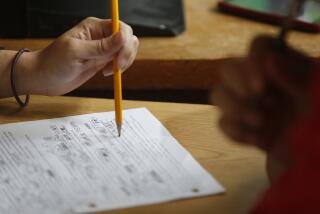For Many of Us, Memory Lane Can Be Dimly Lit
- Share via
Meghan Pierce is a 16-year-old senior whose excellent memory has helped her achieve a 3.9 grade-point average in a tough Fairfax County, Va., academic program. But asked which of last year’s lessons she is forgetting this summer, she joked, “Everything.”
George Spilich, chairman of the Psychology Department at Washington College in Chestertown, Md., and a researcher on memory, can recollect students from 20 years ago and knows where they sat--but he’s not sure what he ate for lunch last week.
It’s not the summer sun causing the lapses. In Pierce’s case, she’s having the most trouble remembering Spanish and history facts, and brain experts say the problem is infrequency of use; in Spilich’s, he simply hasn’t organized a structure in his head to store that information. Teachers construct in their brains a schema--or organizational structure--that more easily remembers students than meals.
Memory lapses, once chiefly the worry of the elderly, have emerged as a source of anxiety among folks of all ages in this era of information overload.
“My mom will tell me to do a chore, and I’ll walk upstairs to get the vacuum cleaner, and I’ll have to walk back downstairs to ask her what I was supposed to do,” said Pierce, who participates in the International Baccalaureate program at Robinson Secondary School.
The concern is fueling a national obsession with improving memory, seen in the millions of dollars spent each year on books and herbs of scientifically dubious value that promise sharper recall.
Researchers--who are just now learning about the complex brain processes that create and store short-term, episodic and long-term retention--say memory can indeed be improved.
But the keys to achieving it are simpler than you might think: lots of practice and better organization. Not to mention focus, something that was reinforced to renowned cellist Yo-Yo Ma after he left his $2.5 million, 266-year-old cello in a New York taxi in 1999 (it was recovered).
Misplace keys? Keep them in the same place every day. Forget names? Use word associations: Knowing someone’s name is Baker means less than remembering that someone is a baker.
And new research is showing that memories can be diminished by stress, nicotine and even small amounts of alcohol, as well as physical trauma. Young soccer players who take a lot of head shots report mild memory problems, Spilich said.
Besides, experts say, forgetting some things is normal.
“We function so well as human beings because in fact we forget things at a very efficient rate,” said neuroscientist James Olds, director of George Mason University’s Krasnow Institute for Advanced Study, which is dedicated to the study of human cognition. “If we flawlessly remember everything about every aspect of every day, we would have tremendous difficulty given the fact that our brains are limited .... Forgetting is as important biologically as memory.”
Although folks who forget how to spell common words or even when to pick up their children worry that they are losing their memories, they probably aren’t, experts said.
“Society is facing problems of baby boomers getting older, and the kinds of memory failures people have are usually mild, trivial and normal,” said Mony De Leon, director of the New York University Center for Brain Health.
It is troublesome, however, when people cannot hold on to new information for more than a few seconds, Schacter said. And, said Terry Goldberg, a neuropsychologist in Bethesda, Md., it is time to get checked when people close to you say, “Boy, you are becoming really forgetful.”
Forgetting long division over the summer doesn’t count, in part because lots of “lost information” isn’t really lost.
The foundation has probably been retained in the brain, and it can be easily retrieved with review in the fall, experts said.
What students generally lose over the summer are isolated facts not embedded in a larger framework, said Ira Black, chairman of the Department of Neuroscience and Cell Biology at the Robert Wood Johnson Medical School in New Jersey.
It is also easier to forget information that is new and different, said Alan Brown, a Southern Methodist University psychology professor. “If you have been studying English grammar all year, it is less likely to be forgotten than the Spanish that you first started taking in the spring semester.”
Of course, it would be easier to excel if everybody had the kind of recall ability that presidential historian Michael Beschloss has.
Beschloss can recall speeches, word for word, that he hasn’t seen in years, and he can do that with historical, literary and geographic material.
It is as if, he said, his brain sees a copy of the text scrolling down or, if he has heard a speech, as if his ear is hearing a recording. Pushed to remember something he isn’t interested in, however, the information just falls “off the dark side of the moon,” he said.
Whether his ability constitutes “photographic” memory is unclear, because researchers are divided about whether such brains operate differently from most.
“I have good news and bad news,” Spilich said. “The good news is that all of us can increase our ability to remember things, but the bad news is that there is no easy road .... Remember the old joke of how you get to Carnegie Hall? Practice, practice, practice.”






